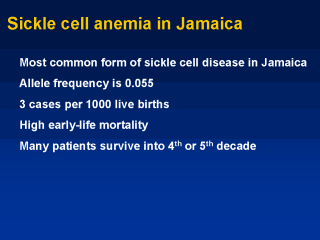 |
SS
disease is the most common form of sickle cell disease in Jamaica, with a frequency of the
sickle cell allele of 0.055 (1). A formal study of life expectancy of Jamaican SS disease
patients has not been done, although it has been known for many years that despite the
burden of high early childhood mortality, survival beyond age 30 (2) or even 40 (3;4) was
not uncommon. Data from a clinic-based patient population, and from a birth cohort are
available in Jamaica, and lifetime survival is investigated using both these populations. References
(1) Serjeant GR, Serjeant BE, Forbes M, Hayes RJ, Higgs DR, Lehmann
H. Haemoglobin gene frequencies in the Jamaican population: a study in 100,000 newborns.
Br J Haematol 1986; 64(2):253-262.
(2) Serjeant GR, Richards R, Barbor PR, Milner PF.
Relatively benign sickle-cell anaemia in 60 patients aged over 30 in the West Indies. Br
Med J 1968; 3(610):86-91.
(3) Morgan AG, Serjeant GR. Renal function in patients over 40 with
homozygous sickle-cell disease. Br Med J (Clin Res Ed ) 1981; 282(6271):1181-1183.
(4) Morris J, Dunn D, Beckford M, Grandison Y, Mason K, Higgs D et
al. The haematology of homozygous sickle cell disease after the age of 40 years. Br J
Haematol 1991; 77(3):382-385. |
